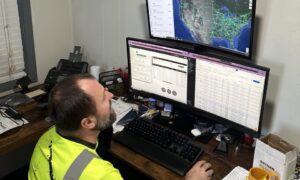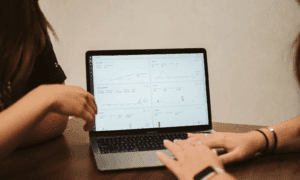In an ever-evolving business world where uncertainty is the only certainty, robust financial forecasting has become the backbone of business planning. The hidden power in data analytics is its capacity to make these forecasts more accurate, helping businesses worldwide to thrive in a fiercely competitive marketplace. Enterprising firms from various industries have started tapping into this potential to avert potential financial pitfalls and guide their strategies towards profitability. The transformation doesn’t end here; even bookkeeping services Sydney is no exception to the trend. This tool is so compelling that even traditional fields like accounting are embracing it in their practices, with significant payoffs.
Unleashing the Power of Data Analytics in Financial Forecasting
While financial forecasting may seem like a straightforward task, it is significantly more complex when you start peeling back the layers. Understanding the real picture of a company’s financial health is a holistic process that requires an intricate analysis of various data points, such as revenue, expenditure, market trends, and economic indicators.
Data analytics provides a much-needed solution to these complexities by offering a comprehensive view of a company’s financial performance. By applying sophisticated analytical models to vast sets of financial and non-financial data, it provides meaningful insights that aid in decision-making.
The Role of Data Analytics in Financial Accuracy
Data analytics is not just about collecting data. It’s about extracting value from that data to drive business growth. In the world of finance, accuracy is paramount. A small error can result in a significant financial loss.
With the aid of data analytics, accountants and financial analysts can leverage vast volumes of data to make more informed decisions and create more accurate financial forecasts. Whether it’s predicting cash flow patterns, identifying potential financial risks, or gauging market trends, data analytics can serve as a reliable compass, guiding businesses towards more profitable outcomes.
Transforming Bookkeeping with Data Analytics
Bookkeeping, often viewed as a mundane task, has undergone a significant transformation with the advent of data analytics. Traditionally, bookkeepers spent countless hours manually recording financial transactions, often leading to human errors and inefficiencies.
However, with data analytics, bookkeepers can automate data recording processes, reducing errors and saving time. More importantly, bookkeeping services now go beyond mere transaction recording. They provide valuable financial insights that inform business strategy and decision making.
How Businesses Benefit from Data-Driven Financial Forecasting
The implications of data-driven financial forecasting extend far beyond the finance department. Businesses of all sizes, from startups to Fortune 500 companies, can benefit significantly from leveraging data analytics in their financial forecasting.
The most prominent advantage is enhanced accuracy in financial planning. With precise forecasts, companies can allocate resources more efficiently, mitigate risks, and seize lucrative business opportunities. Additionally, accurate financial forecasting enables businesses to stay ahead of their competition by anticipating market trends and customer behavior.
The Intersection of AI and Data Analytics in Financial Forecasting
Artificial Intelligence (AI) is playing a significant role in data analytics, adding an extra layer of sophistication to financial forecasting. AI algorithms can process enormous amounts of data in real-time, identify patterns, and generate forecasts with unprecedented accuracy.
Additionally, AI can continuously learn and adapt to changes in the business environment, making financial forecasting more dynamic and responsive. As a result, businesses can make quicker, data-driven decisions that align with their strategic goals.
Challenges and Solutions in Implementing Data Analytics
While data analytics offers tremendous potential for enhancing financial forecasting, it is not without its challenges. Data security, data quality, and the need for skilled personnel are some of the key issues businesses face.
However, these challenges are not insurmountable. With the right strategies and tools in place, businesses can effectively navigate these obstacles. This includes investing in secure data storage solutions, implementing data quality management practices, and upskilling staff through regular training and workshops. Moreover, third-party services like bookkeeping services Sydney can assist businesses in managing these challenges, offering expertise and innovative solutions.
Data Analytics: A Vital Tool for Accountants
For accountants, data analytics is no longer an optional skill but a necessity. The evolution of the accounting landscape mandates proficiency in data analysis. This shift in paradigm results from the need for deeper insights into financial data to enhance accuracy in financial forecasting.
By harnessing the power of data analytics, accountants can drive financial planning, control, and decision-making processes with greater precision. Furthermore, the incorporation of data analytics in bookkeeping practices is empowering accountants to take a more strategic role, contributing to overall business growth and profitability.
Conclusion
In conclusion, the role of data analytics in financial forecasting is both profound and transformative. Its ability to analyze vast amounts of data, extract meaningful insights, and predict future trends makes it an indispensable tool for financial planning and decision-making.
The integration of data analytics in traditional accounting practices such as bookkeeping has not only enhanced accuracy but also revolutionized the role of accountants, positioning them as strategic contributors to business success.
While challenges exist, they are surmountable with the right approaches and the continuous evolution of technology. As data analytics continues to redefine the business landscape, its influence on financial forecasting is only expected to grow, becoming a cornerstone of modern accounting and finance practices.
The age of data is here, and businesses that harness its power in their financial forecasting will undoubtedly stand at the forefront of their industries, navigating the uncertainties of the future with greater confidence and precision.

































